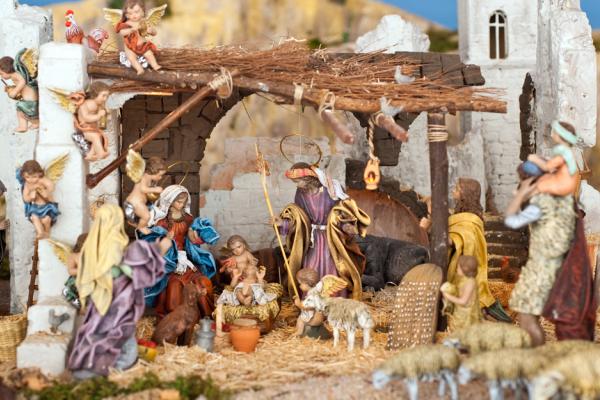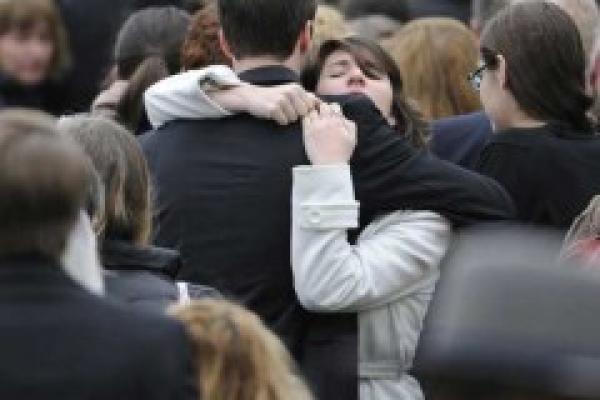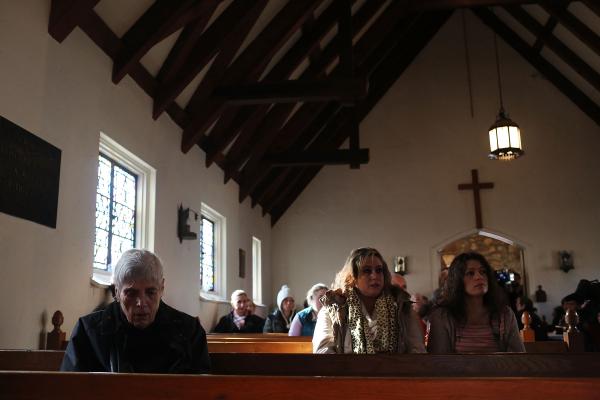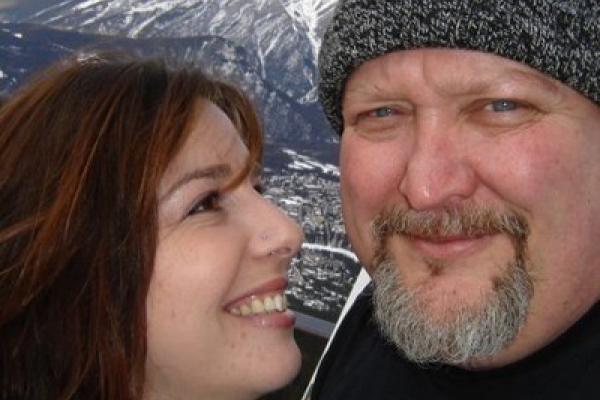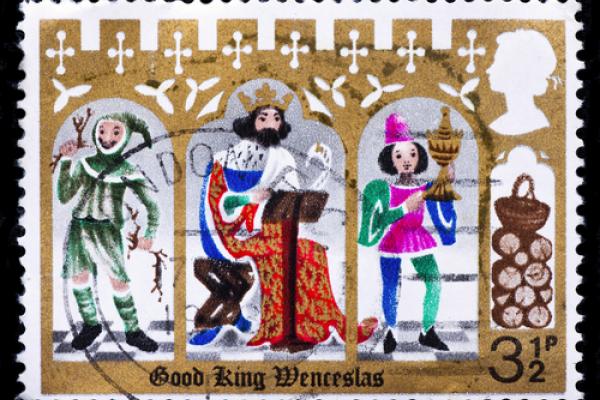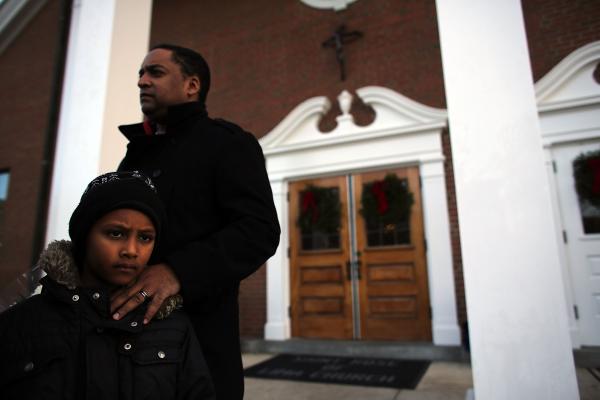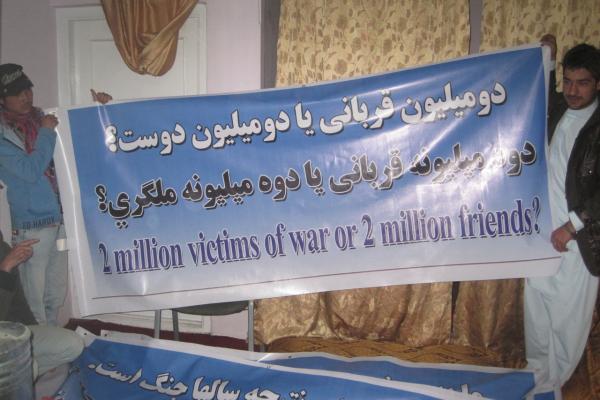I’m sure most of us have played the scene in our heads one too many times: little baby Jesus, presumably Caucasian, lying in a tiny crib-esque manger comfortably padded with hay — even though the song specifically says “no crib for a bed” — while the animals, which are perfectly behaved, quietly and reverently look on. Cue the wise men, in their strange, exotic garb, and sprinkle a few angels in there — you know, the ones that look like babies with wings and white togas.
That was my impression of the nativity scene as a kid, and the popular children’s Christmas carol, “Away in a Manger” didn’t do anything to help. It seemed to perpetuate the picturesque nativity image of most of the figurine depictions in our living rooms.
But, if only for a few minutes, put aside the notions that the “manger” probably wasn’t as clean and cozy as we thought, that it probably wasn’t a silent night — have you met a baby that’s gone through its first 24 hours without crying? — or that Jesus probably wasn’t snug in a crib conveniently left in a manger.
Even though the song may seem like it only deserves a cursory glance, as it was originally published in theLittle Children's Book for Schools and Families in 1885, I purport there’s something more to the childhood classic.
Editor's note: This essay has been adapted from Gender Balancing our World.You can read the full article HERE.
We had barely gobbled down our last bite of turkey and pumpkin pie before the familiar lines of carols began to ring in our ears and warm our souls. Joy to the world! Peace on earth! Good will to all! Let heaven and nature sing! I don't know about you, but as I string up lights, pull out the advent wreath and boxes and boxes of ornaments and tangled lights, the lofty words of our beloved carols have a way of triggering a paradoxical mix of joy, generosity, and enlarged spiritual vision, yet also a fairly predictable malcontendedness about the state of things.
How strange it is that Christmas carols can make me want both to buy an iPhone 5 and a Mac Airbook and in the same moment want to save the world? I admit that I keep Santa’s Amazon elves very busy this time of year, yet in quiet moments the contradictions between the high ideals of the season and the harshness of our egregiously unjust world nag at my soul.
“Oh, God!”
That cry has echoed ever since news of the horrific shooting at Sandy Hook Elementary School in Newtown, Conn.
As the names of those who died are made known, that cry is followed by a question: Why? Why does God allow evil?
This agonizing question arises among religious believers after tragedies great and small. It’s also one that priests, pastors, rabbis, and imams will wrestle with.
The Rev. Jerry Smith of St. Bartholomew Episcopal Church in Nashville said that although this weekend marked the third Sunday in Advent, which focuses on hope in advance of Christmas, the church also has to talk about the reality of evil.
“We have to speak about this shooting and we have to recognize, this is the very darkness that Christ came into the world to dispel,” Smith told The Tennessean.
The Rev. Neill S. Morgan, pastor of Covenant Presbyterian Church in Sherman, Texas, says on the congregation’s website that now is a time for prayer.
But, says Morgan, “all the existential questions about God, justice, and love” will come. “We wonder what we can do to prevent such violence in the world, our nation, and our community.”
I’ve seen plenty of articles responding to the shooting in Sandy Hook, Connecticut. Some are angry, some pastoral, still others, prophetic in their call for change in various forms. I have little to add to the conversation at that level, but I have heard questions from many children, some from my own kids. I thought I’d offer some responses I’ve shared.
What happened?
Something terribly sad. A man hurt some children and adults in a school in Connecticut. Some of them died. The teachers and students were very brave, and the community is working together to take care of those who survived and those who lost someone they loved. Even the President went there to be with them.
NEWTOWN, Conn. — Dealing with the pain of the school shooting that claimed 28 lives will take faith, support, and joyous Christmas celebrations, church leaders said at the first Sunday services held since the tragedy.
At houses of worship around town, people gathered in pews, crying, kneeling, and hugging each other through services that focused on remembering the victims of the Sandy Hook Elementary School shooting, uniting the community, celebrating the meaning of Christmas and preventing similar disasters.
Yet even this beleaguered town's day of worship provided a moment of fear when congregants at St. Rose of Lima Roman Catholic Church fled the building, saying they were told there was a bomb threat. Police with guns drawn surrounded the church. No injuries were reported, but the church canceled all events for the day.
Earlier in the day, services at St. Rose, much like other places of worship in the area, were focused on the tragedy.
The estranged son of a Kansas pastor famous for protesting the funerals of soldiers and AIDS victims has condemned his family’s plans to picket the funerals of the 26 people — including 20 children — who were killed when a gunman stormed a Connecticut elementary school.
In the wake of Friday’s massacre in Newtown, Conn., members of Westboro Baptist Church in Topeka, Kan., posted Twitter messages saying they would picket outside Sandy Hook Elementary School in Newtown. The messages provided no information on the time of the planned picketing.
"Westboro 'God hates Fags' Baptist Church is planning to picket at Sandy Hook, to praise 'God's judgment,'” was posted by Margie Phelps, the daughter of Westboro leader Fred Phelps Sr. Her sister, Shirley Phelps-Roper, tweeted Saturday that the group would "sing praise to God for the glory of his work in executing his judgment."
When I go home for Christmas, I always end up pulling out the old Christmas songbook from inside the piano bench and working my way through while my mom cooks dinner. I don’t really read the music as much as I read the chords and play by ear. Good King Wenceslas is a beautiful song musically, but is one of the most fun songs to play because of the never-ending chord changes.
I never really considered what the song was about, being raised in a school system that taught of the tyranny of monarchies and the Revolutionary War. Medieval leaders ruled in an age of knights, castles, and oppressed peasants. But then there was Wenceslas (who I now know was the Duke of Bohemia).
One commentator suggested that it was precisely because God was not there that this heinous act happened. Gov. Mike Huckabee claimed we should not be surprised to see this kind of violence since we have removed God from our schools and our society. His sentiment is to say, “God is NOT here.” If that is the case, then it surely can explain the existence of pure evil that we saw displayed on Friday.
However, thinking like that of Gov. Huckabee suggests that we somehow have the power to remove God from our schools and our society. This kind of God is quite small, weak, and impotent — one that is dictated by the mere whims of humanity. This is not the God of whom Matthew spoke.
Matthew spoke of the Almighty God fully embodied and revealed in the person of Jesus. So much so that he claimed he was Immanuel: God with us. He is here not in spite of the pain, nor did he come to explain it away. God is here in the midst of our suffering.
The hope of Advent is that God responded to the suffering of humanity by entering into it with us. He did not stand outside of it and look in with a wincing face and hope that everything would somehow work out. Nor did he see humans who removed him from their schools and societies and say, “Well fine, then, have it your way!” Not at all.
Afghanistan is one of the most desperate, beat up places in the world. Forbes magazine has called it the most dangerous nation on earth. Over 30 years of war have left 2 million people dead, and much of the country in chaos. But even in the most troubled places on earth, there always seems to be a little group of people who refuse to accept the world as it is and insist on building the world they dream of, a little group of people who believe despite the evidence and watch the evidence change.
A few years ago, I began to hear about a little group of young people in Afghanistan doing exactly that. Many of them had seen their loved ones, friends and family killed. They were tired of blood. Tired of war. And so they began to organize, and educate, and train themselves for peace. They studied the heroes of nonviolence, Gandhi and King. A few of them even travelled to India to learn nonviolence and community from Gandhi’s ashram. Now they have their own ashram in Kabul, where dozens of them live together and work for peace.
And they have begun to build a movement: marching in the streets, planting trees, building parks as monuments of peace. They started wearing blue scarves as a symbolic reminder that there is one blue sky that connects us all, and now their little movement is catching the world’s attention. It is a movement of friends without borders.
The motto of their movement is this: “A little bit of love is stronger than all the weapons in the world.”
